May 17, 2025 | 03:43 GMT +7
May 17, 2025 | 03:43 GMT +7
Hotline: 0913.378.918
May 17, 2025 | 03:43 GMT +7
Hotline: 0913.378.918
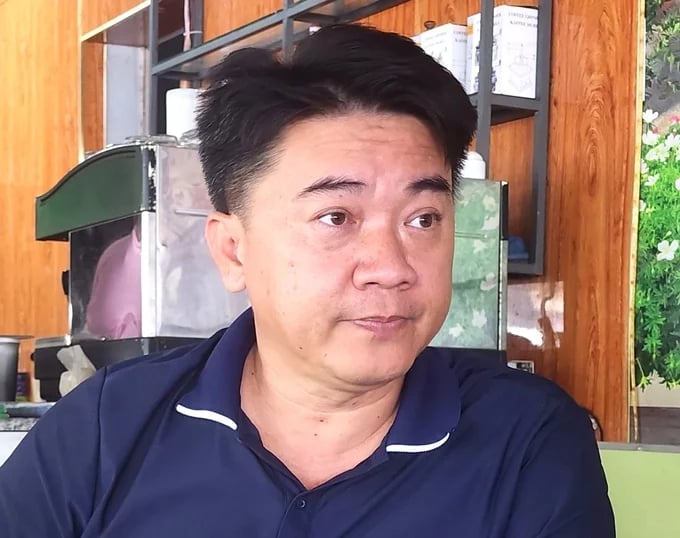
Dr. Nguyen Dinh Quang Duy. Photo: Hoang Anh.
Towards the end of 2023, an event captured the attention of Vietnam's seafood industry: Viet Long Capital announced a $5 million investment in the Vietnam Sea Cucumber Company to advance the cultivation, processing, and exportation of the prized sandfish. As aspirations for a multi-million-dollar industry burgeon and the vision of establishing Vietnamese sea cucumbers as a national brand materializes, it is crucial to acknowledge the pivotal role played by one individual. That individual is Dr. Nguyen Dinh Quang Duy of Aquaculture Research Institute 3, under the Ministry of Agriculture and Rural Development.
Dr. Nguyen Dinh Quang Duy is often hailed as the preeminent authority on sea cucumbers worldwide. Surrounding this 46-year-old native of Quang province, with nearly half of his life dedicated to seafood research, are numerous anecdotes, particularly those intertwined with sea cucumbers. For instance, there is the narrative of Dr. Nguyen Dinh Quang Duy, who, fresh out of university, assumed leadership of a ministerial-level project on sea cucumber research upon joining Institute 3. He subsequently became the first individual in Vietnam to successfully breed sand sea cucumbers and initiate commercial farming operations. Another tale recounts how the Australian Centre for International Agricultural Research (ACIAR) granted him special authorization to pursue a Ph.D. at James Cook University (JCU), a preeminent institution renowned for its expertise in aquaculture and marine ecology.
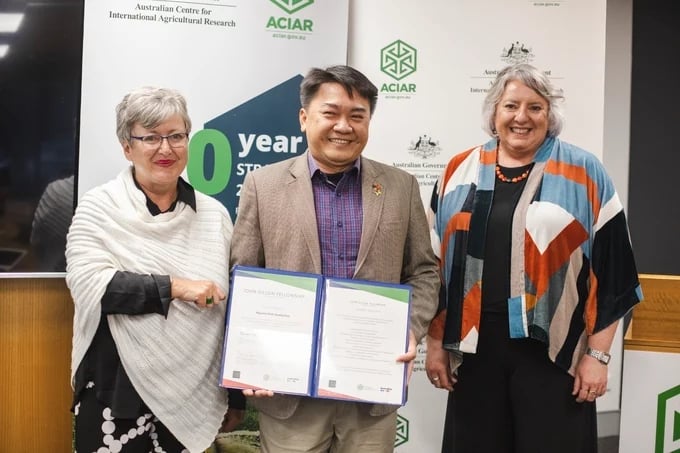
Dr. Nguyen Dinh Quang Duy is revered by the international scientific community as the foremost expert on sea cucumbers. Photo: Phuong Chi.
To begin, let us briefly delve into some key aspects of sea cucumbers. They are a rare marine species often likened to the ginseng of the sea. With approximately 1,400 known species worldwide, they primarily inhabit natural environments. Some species, categorized as sea leeches, are considered rare, with certain varieties even listed in the Red Book. Their rarity stems not only from their significant economic value and inability to be cultured but also from their ecological importance in marine environments. In essence, sea cucumbers function akin to environmental stewards of the sea. Their diet primarily consists of plankton, allowing many species to aerate seagrass beds, safeguard coral reef ecosystems, and cleanse sandy substrates, thus aiding in environmental regeneration and marine ecosystem restoration.
In addition to their nutritional and medicinal values, scientists worldwide have long been engaged in dedicated research efforts aimed at cultivating sea cucumbers. Among the most fervent researchers are Australians. Scientists in this leading maritime nation have directed considerable attention toward breeding sea cucumbers, not only for reintroduction into local waters but also to assist other countries in the Pacific region. Their objective is twofold: to replenish marine resources and establish sustainable livelihoods, thereby alleviating the pressure of natural exploitation on sea cucumber populations.
Particularly noteworthy is the sand sea cucumber, esteemed for its exceptional nutritional value and recognized as the most industrious "marine environmental custodian." Despite numerous multinational scientific research initiatives and substantial funding allocated to sea cucumber research, success has remained elusive. These endeavors have thus far been confined to experimental research stages and have failed to yield commercial viability in sea cucumber aquaculture.
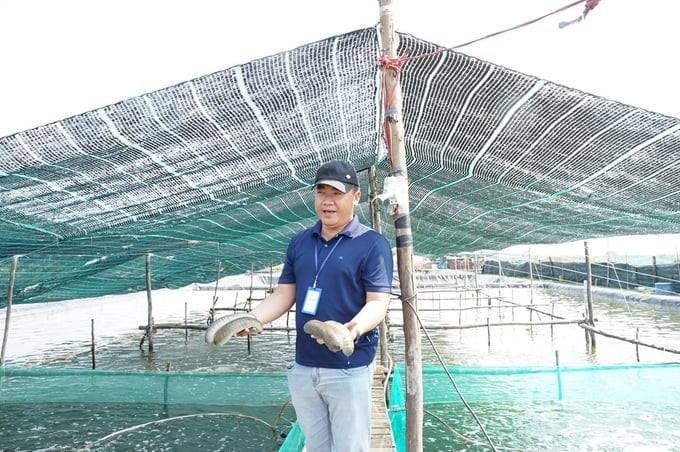
Sea cucumber expert Nguyen Dinh Quang Duy. Photo: Linh Linh.
The pivotal moment arrived in 2001 when Nguyen Dinh Quang Duy emerged on the scene. Initially, just a recent graduate from Nha Trang University of Fisheries, he joined Aquaculture Research Institute 3 and was tasked with spearheading the sea cucumber breeding and farming project in collaboration with the International Center for Living Aquatic Resources Management (ICLARM), now known as the Worldfish Center.
This marked a significant turning point for both the young engineer and the Vietnamese sea cucumber industry. Despite being a novice in the field, with limited global research and scant reference materials, he miraculously achieved success. As the driving force behind the project and subsequently the leader of two ministerial-level sea cucumber research initiatives, Nguyen Dinh Quang Duy and his team successfully harvested sand sea cucumbers for seed production and facilitated the implementation of sand sea cucumber farming models.
In 2007, during a visit to Institute 3 by the then Minister of Fisheries, Mr. Ta Quang Ngoc, the minister inquired, "Who among you has succeeded in sea cucumber cultivation?" Directly addressing Nguyen Dinh Quang Duy, he tasked him with advancing the development of sand sea cucumbers for provinces along the South Central Coast.
Furthermore, following the dissemination of various publications and research findings showcasing Institute 3's mastery of sea cucumber farming technology at regional seminars on sea cucumber farming in the Asia-Pacific region, Nguyen Dinh Quang Duy garnered admiration from numerous international scientists and experts. Consequently, young scholars from Institute 3 ascended to prominent positions within the global sea cucumber community, being invited as international experts to countries and territories such as New Caledonia Island (France), the Philippines, and Sri Lanka.
In 2013, engineer Nguyen Dinh Quang Duy seized the opportunity to pursue a Ph.D. under the prestigious John Allwright scholarship in Australia, actively participating in projects aimed at supporting countries in their research endeavors concerning sea cucumbers.
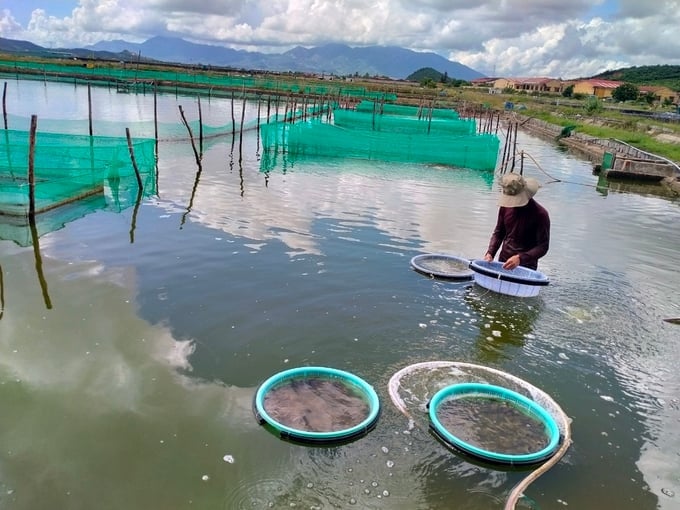
Sea cucumber farming in Khanh Hoa. Photo: Phuong Chi.
Upon returning home in 2017, Nguyen Dinh Quang Duy lamented the lackluster state of the Vietnamese sea cucumber industry despite the proliferation of commercial farming models. The depletion of natural sea cucumber populations due to overfishing, compounded by conflicts over marine resources, has resulted in once-rich areas like Cam Ranh Bay witnessing a stark decline in sea cucumber numbers. Divers now venture to places like Hoang Sa, Truong Sa, and other major islands in search of natural sea cucumbers, only to find them scarce compared to previous years. Concurrently, commercial sea cucumber farming has been plagued by instability. Outdated processing techniques, primarily sun-drying and salt-drying, yield low-value products, while the production chain is disrupted by intermediaries and traders, leaving farmers struggling to find markets. This painful reality underscores the peril of producing without a clear market outlet, leaving farmers in dire straits. Moreover, competition from white shrimp and snails further dampens the success of sea cucumber breeding efforts despite years of investment and research. The devastating Typhoon Damrey in late 2017 exacerbated these challenges by destroying existing sea cucumber farming infrastructure in the South Central region, undoing the progress made by scientists and communities.
"I empathize with the aspirations of our people," reflects Nguyen Dinh Quang Duy. "While acknowledging our modest advantages and potential in sea cucumber cultivation, it's imperative to recognize that no one understands sea cucumbers better than the Vietnamese. What our people truly need are reliable markets, high-quality seed sources, access to market information, and the dissemination of scientific and technological knowledge."
Addressing these needs necessitates concerted efforts from the government, scientists, and dedicated businesses capable of constructing and managing a comprehensive value chain. It's imperative to understand that without a functional value chain, progress is stymied, not just in sea cucumber farming but in every industry. Nguyen Dinh Quang Duy, through his pioneering efforts, laid the foundation and fostered the growth of the sea cucumber industry in Vietnam, leaving behind a legacy of knowledge and progress.
The process begins with market exploration followed by organized production. Identifying partners, facilitating seed, capital, and technical support to establish farming areas, and subsequently researching processing solutions to elevate sea cucumbers into high-value products are essential steps. Sea cucumbers harvested from ponds must promptly undergo processing to yield high-value products, departing from traditional practices. Each link in the value chain must be delineated with clearly defined rights and responsibilities secured through contractual agreements to ensure a cohesive journey, devoid of seasonal thinking.
Starting from the seed stage and extending to market access, the gradual completion of the value chain marks a significant milestone in the Vietnamese sea cucumber journey.
Institute 3, in collaboration with the Vietnam Sea Cucumber Joint Stock Company, initiated models in Phu Yen and Khanh Hoa. Recognizing the novelty of sea cucumber cultivation and the associated informational gaps, Nguyen Dinh Quang Duy underscores the importance of establishing connections to address these challenges.
Through agricultural extension programs and partnerships between individuals and businesses, 10 households in Khanh Hoa and Phu Yen were chosen to establish sand sea cucumber production areas spanning 10 hectares. These farmers received seed support, technical training, and product purchase commitments. From model sites, knowledge dissemination permeated communities, fostering peer-to-peer learning and trust-building for sustainable business relationships.
Core model members emerged as sea cucumber ambassadors, passing on their knowledge and selecting new households to establish additional models as implementation progressed. Businesses infused capital, sought markets, and cultivated brands, while scientists from Institute 3 provided seed supply, technical guidance, and ongoing research to advance technology transfer.
Collectively, these efforts solidified the value chain from production to processing and consumption, akin to an expanding oil slick on the sea. As a result of this endeavor, there are now nearly 100 hectares of raw material areas dedicated to sea cucumber farming in Phu Yen and Khanh Hoa.
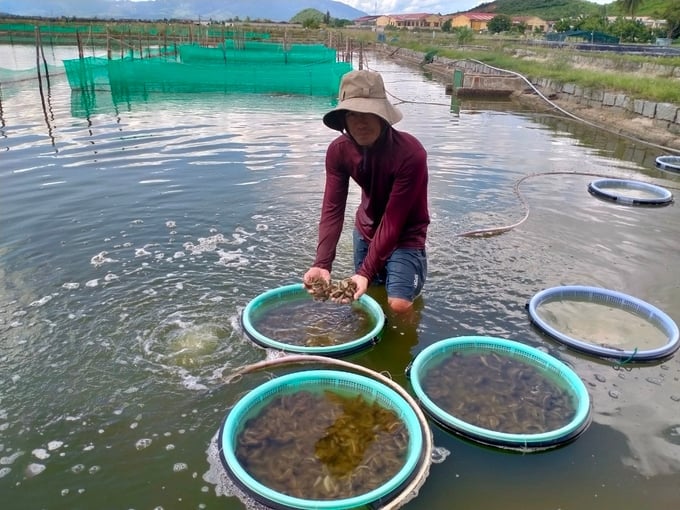
Building models of sea cucumber farming in a chain. Photo: Phuong Chi.
The economic, social, and environmental significance of sea cucumbers is now undeniable. Vietnamese sea cucumbers have attained high economic value akin to other prestigious products in Vietnam such as bird's nest and ginseng. Their environmental value aligns with the most stringent global standards, while scientific research underscores their transformation from a mere commodity to a medicinal herb. Nano powder products derived from sea cucumbers and compounds that inhibit cancer cell growth are being validated. Observing China's sea cucumber entrepreneurs amassing considerable wealth, and witnessing the burgeoning interest from markets like Taiwan and Singapore, Vietnamese sea cucumber products are increasingly asserting their value and brand. I envision and firmly believe that Vietnam will witness many individuals achieving prosperity through sea cucumbers," confides Dr. Duy.
This grand vision originated from a passion for research, grounded in scientific principles and practical production methodologies. Following the success with sand sea cucumbers, Dr. Nguyen Dinh Quang Duy has also triumphed in breeding white-breasted and recently, black sea cucumbers. These achievements, scientifically speaking, are exponentially more challenging than breeding sand sea cucumbers. Dr. Duy emphasizes the importance of researching multi-target production, fostering ecological diversity, and establishing balanced ecosystems to benefit farmers. However, the research on seed production and commercial farming requires additional time to be perfected. Aquaculture is not akin to cultivating rice or potatoes; each investment carries significant financial implications, and even minor errors can lead to severe consequences for farmers.
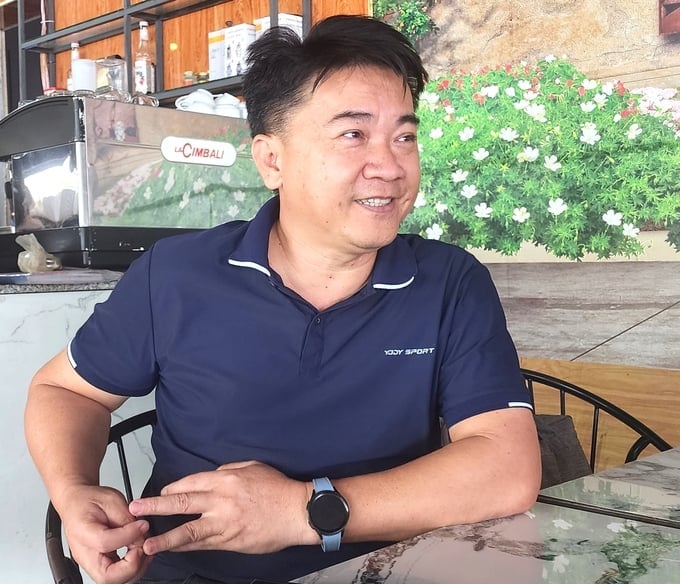
Builder of the Vietnamese sea cucumber chain. Photo: Hoang Anh.
Dr. Duy's ambitious aspiration for Vietnamese sea cucumbers is rooted in the fact that approximately 10 species boast substantial economic potential, ripe for research and propagation. This signifies the immense potential of the sea cucumber industry. The prevailing global consumption trend favors organic and community-centric products, transcending mere traceability and planting area codes to encompass the entire production chain, including the well-being of producers. The trajectory of Vietnam's sea cucumber narrative aligns with the most exacting standards. Dr. Nguyen Dinh Quang Duy shares insights into the future trajectory of sea cucumber farming research and development in Vietnam.
This audacious dream is entirely plausible, underpinned by unwavering confidence. Dr. Duy's endeavors have not only showcased the intellect and scientific prowess of the Vietnamese people to the international community but have also laid a solid foundation for realizing this vision.
Translated by Quynh Chi

(VAN) Vietnam’s TH Group officially put its high-tech fresh milk processing plant into operation in the Russian Federation, marking a historic moment as the first TH true MILK cartons were produced in Russia.

(VAN) Use of high-quality broodstock and biotechnology is regarded as the most effective approach to ensuring sustainable and economically viable shrimp aquaculture ahead of climate change and the emergence of increasingly intricate disease patterns.

(VAN) Carbon farming is a form of agricultural practices that helps absorb more greenhouse gases than it emits, through smart management of soil, crops, and livestock.

(VAN) This is a key content of the Memorandum of Understanding recently signed between the Vietnam Fisheries Society and Kunihiro Inc of Japan.

(VAN) To achieve the goal, local authorities and businesses in Kon Tum province have fully prepared the necessary conditions for the new Ngoc Linh ginseng planting season.
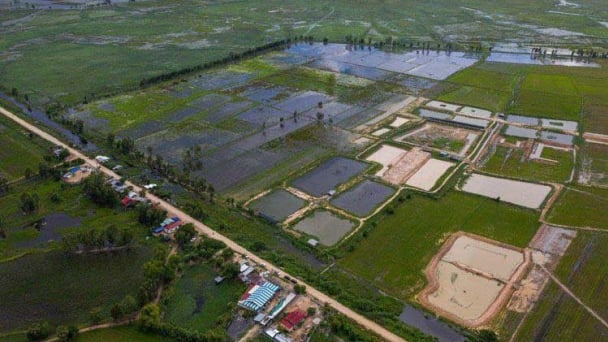
(VAN) Jiangsu province is gearing up to host training programs in Phnom Penh, the capital of Cambodia, this year to establish the Fish and Rice Corridor.
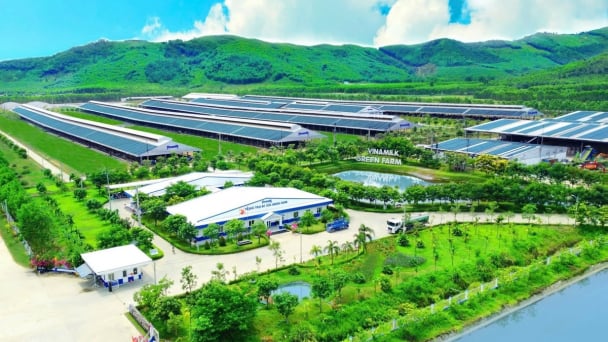
(VAN) Le Hoang Minh, representing Vinamilk, shared the company's experience in energy saving and green energy transition for production at a workshop held during the P4G Summit.